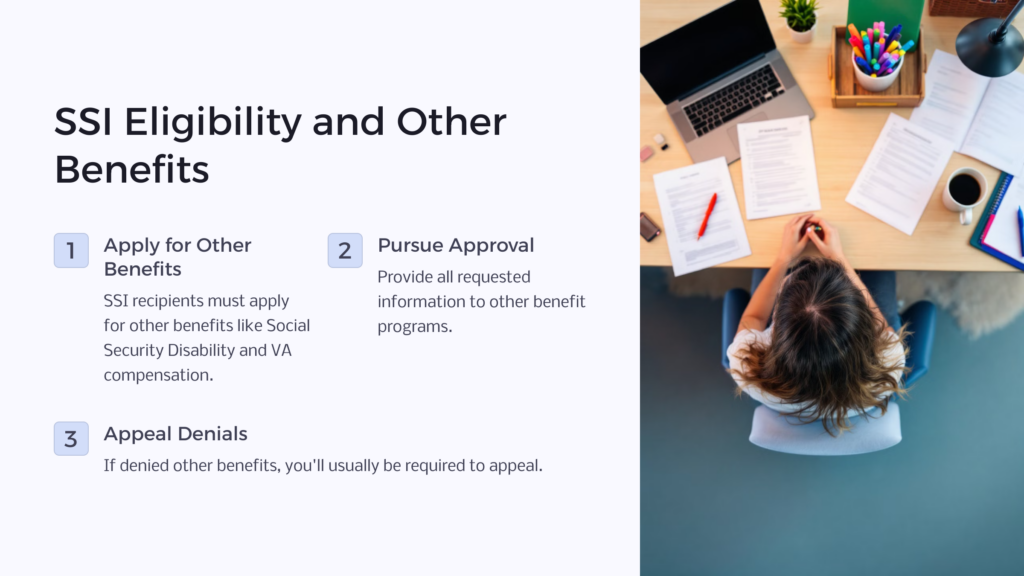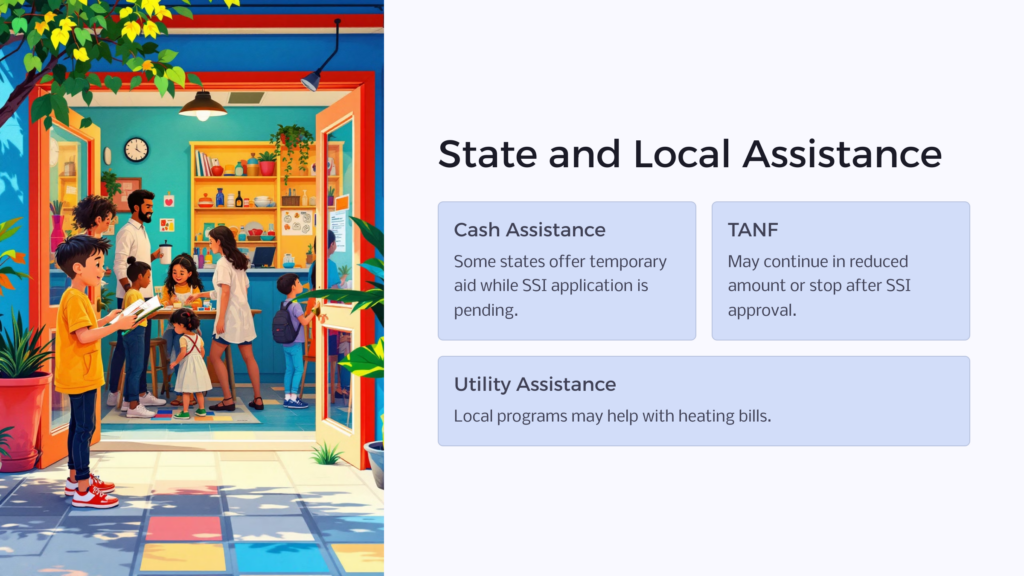Supplemental Security Income
SSI stands for Supplemental Security Income. Supplemental Security Income is a federal public assistance program for disabled individuals and people age sixty-five or older whose income and assets are below the SSI limits.

SSI is intended to supplement other benefits that you are eligible to receive. For this reason, when you apply for SSI, you will be required to apply for other benefits such as Social Security Disability, workers’ compensation, VA disability compensation, and private retirement or disability benefits. In addition to applying, you must pursue approval by providing everything the other benefit program requests for your application. If you are denied benefits because you did not fully pursue your claim for other benefits, your SSI benefits could be terminated. If you are denied for other reasons, you will usually be required to appeal.
Once you receive the other benefits, your SSI benefits will be reduced to supplement your other income or your SSI payments may terminate because your other benefits are higher than the SSI income limit.
When You May Be Eligible for Both SSI and SSDI
It is worth noting that individuals with Social Security benefits below the SSI income limit may be eligible for both Social Security and SSI on an ongoing basis, if their total income and assets fall within the SSI guidelines.
If your Social Security benefit is too high to receive ongoing SSI, you may be eligible for SSI for a limited period of time. Because financial eligibility for SSI is determined month by month and income counts only in the month it is received, a person who qualifies for a Social Security Disability benefit that is higher than SSI limits may be eligible for SSI for months that his or her Social Security claim was being processed and during the five-month waiting period for which no Social Security benefits are payable. When you file Social Security Disability, the Social Security Administration will automatically discuss your potential eligibility for SSI.
What other help can I get after I meet the SSI Disability qualifications and get an SSI approval?
Find out about federal, state, and local assistance you may qualify for once you have received an SSI approval or even upon filing an SSI application.

Medicaid Health Insurance
In most states, if you receive an SSI approval, you will automatically be eligible for Medicaid health insurance. In other states, you must apply for Medicaid at an agency of the state or county in which you live. If you need to apply to the state for Medicaid, the Social Security Administration will let you know and will tell you where to apply.
If you are eligible for both Medicaid and Medicare, typically the Medicaid program pays your Medicare Part B and D premiums.
Supplemental Nutrition Assistance Program
Financial assistance to purchase food used to be called food stamps. Today it is called SNAP, short for Supplemental Nutrition Assistance Program. Eligibility for SNAP is based on financial need and SSI benefits count in determining eligibility for SNAP.
In most states, if you are applying for or are receiving SSI, you can get a SNAP application and/or some SNAP information at your local Social Security office. In some states, if you are applying for SSI and live alone, your SSI application is also an application for SNAP. Except in California, if all members of your household receive SSI, the Social Security Administration may help you complete a SNAP application or re-certification. If you need to apply for SNAP in a state office, your Social Security office will provide its location and phone number.
Other Help With Health Insurance
If you have children and your family has low income, you may be able to get Medicaid for your children without SSI eligibility. If not, the children might be eligible for insurance under the Children’s Health Insurance Program (CHIP). The website www.insurekids.gov and www.healthcare.gov will provide more information. You can also call 1-877-543-7669 for more information about health insurance for children.
If your income is low, but you do not qualify for SSI, you may get help paying your Medicare premiums with one of the following programs: Qualified Medicare Beneficiary, Specified Low-Income Medicare Beneficiary, Qualified Individual, or Qualified Disabled Working Individual. To apply for any of these programs contact your state or local social service agency or medical assistance office. More information about these programs is available by calling the Medicare toll-free number 1-800-633-4227 or 1-877-486-2048 for the deaf or hard of hearing.
State or Local Cash Assistance

Some states pay assistance based on disability or age while an SSI application is pending. Upon SSI approval, the state requires repayment. Accordingly, the Social Security Administration will reimburse the state from your SSI back pay when you receive an SSI approval. After SSI eligibility, your Temporary Assistance for Needy Families (TANF) will either continue in a reduced amount or stop due to your SSI income.
Housing and Utility Assistance
You can contact Housing and Urban Development (HUD) or your local housing authority to get on a waiting list for possible government-subsidized housing. If you are homeless, reach out to your closest governmental agency or non-profit that provides housing assistance for individuals and families who are homeless. Local non-profits and power companies sometimes have energy assistance programs to help with winter heating bills.
Index of States That Supplement Payment When You Are Approved for SSI Benefits
Find out which states will pay you an extra amount when you’re approved for SSI benefits.
States That Supplement Federal SSI
The following is a list of states that will pay a supplement when you are approved for SSI benefits, if you fall within the category of SSI applicants to which the State Supplement applies.
- Alabama
- Alaska
- Arkansas
- California
- Colorado
- Connecticut
- Delaware*
- District of Columbia*
- Florida
- Georgia
- Hawaii
- Idaho
- Illinois
- Indiana
- Iowa*
- Kansas
- Kentucky
- Louisiana
- Maine
- Maryland
- Massachusetts
- Michigan
- Minnesota
- Mississippi
- Missouri
- Montana
- Nebraska
- Nevada
- New Hampshire
- New Jersey
- New Mexico
- New York
- North Carolina
- Ohio
- Oklahoma
- Oregon
- Pennsylvania*
- Rhode Island*
- South Carolina
- South Dakota
- Tennessee
- Texas
- Utah
- Vermont
- Virginia
- Washington
- Wisconsin
- Wyoming
In 2018, the states followed by an asterisk(*) contracted the Social Security Administration to administer some or all of their supplemental payments.
 Benefits.com Advisors
Benefits.com Advisors
With expertise spanning local, state, and federal benefit programs, our team is dedicated to guiding individuals towards the perfect program tailored to their unique circumstances.
Rise to the top with Peak Benefits!
Join our Peak Benefits Newsletter for the latest news, resources, and offers on all things government benefits.




















